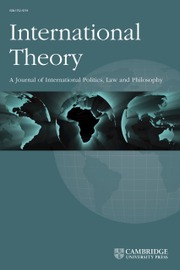-
- You have access: full
- Open access
- ISSN: 1752-9719 (Print), 1752-9727 (Online)
- Editors: Claudia Aradau King’s College London, UK, Catherine Lu McGill University, Canada, and David Welch University of Waterloo, Canada
- Editorial board
International Theory is a peer-reviewed journal that publishes innovative theoretical scholarship about problems of world politics, broadly understood. The journal has three pillars: (1) explanatory, interpretive, or critical theory; (2) normative theory; and (3) international legal theory. We welcome submissions of each kind, or that cross categories. We also welcome submissions that advance our understanding of the history of the development of ideas in the study of any aspect of international politics.
While International Theory welcomes scholarship that uses empirics to advance theoretical arguments, articles whose primary focus is empirical do not fall within the journal’s remit. Nor do articles that concern only a specific country or region; that are better suited to comparative politics journals; or whose primary goal is policy advocacy or foreign policy analysis.
International Theory aims to promote communication and engagement across theoretical and disciplinary traditions. Accordingly, it puts a premium on contributors’ ability to reach as broad an audience as possible, both in the questions they engage and in their accessibility to scholars with diverse theoretical commitments or methodological approaches. While the journal is open to work that is situated within one scholarly tradition, it encourages authors to reflect on how their research relates to other work in the field more broadly.
While International Theory welcomes scholarship that uses empirics to advance theoretical arguments, articles whose primary focus is empirical do not fall within the journal’s remit. Nor do articles that concern only a specific country or region; that are better suited to comparative politics journals; or whose primary goal is policy advocacy or foreign policy analysis.
International Theory aims to promote communication and engagement across theoretical and disciplinary traditions. Accordingly, it puts a premium on contributors’ ability to reach as broad an audience as possible, both in the questions they engage and in their accessibility to scholars with diverse theoretical commitments or methodological approaches. While the journal is open to work that is situated within one scholarly tradition, it encourages authors to reflect on how their research relates to other work in the field more broadly.

